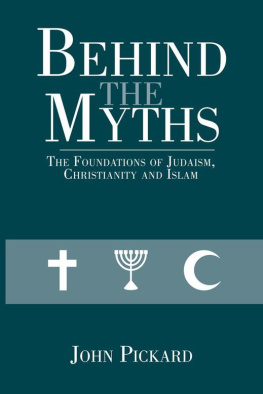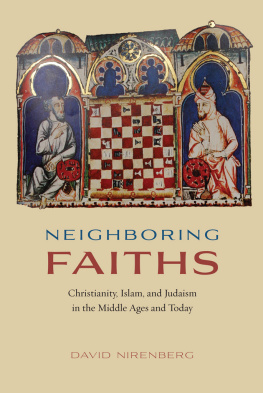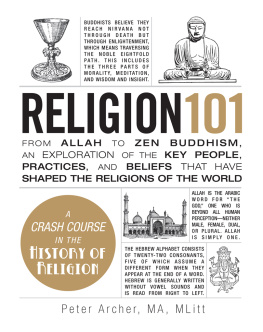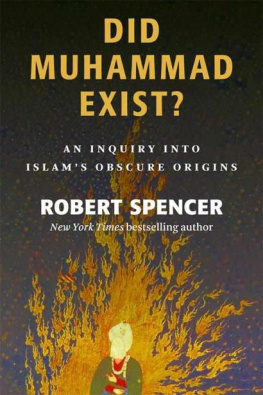BEHIND
THE
MYTHS
THE FOUNDATIONS OF JUDAISM,
CHRISTIANITY AND ISLAM

JOHN PICKARD

AuthorHouse
1663 Liberty Drive
Bloomington, IN 47403
www.authorhouse.com
Phone: 1-800-839-8640
2013 by John Pickard. All rights reserved.
No part of this book may be reproduced, stored in a retrieval system, or transmitted by any means without the written permission of the author.
Published by AuthorHouse 02/21/2013
ISBN: 978-1-4817-8362-0 (sc)
ISBN: 978-1-4817-8363-7 (e)
Any people depicted in stock imagery provided by Thinkstock are models, and such images are being used for illustrative purposes only.
Certain stock imagery Thinkstock.
Because of the dynamic nature of the Internet, any web addresses or links contained in this book may have changed since publication and may no longer be valid. The views expressed in this work are solely those of the author and do not necessarily reflect the views of the publisher, and the publisher hereby disclaims any responsibility for them.
Contents
Chapter 1
Chapter 2
Chapter 3
Chapter 4
Chapter 5
Chapter 6
Chapter 7
Chapter 8
Chapter 9
Chapter 10
Chapter 11
Chapter 12
Chapter 13
Chapter 14
Chapter 15
Chapter 16
Chapter 17
Chapter 18
Appendix I
Appendix II
Appendix III
Appendix IV
As the twenty first century progresses, there has been an increasing interest and not a small amount of debate on the role of religion in society, on the rise of secularisation and on the role of religion in politics. The neo-liberal right wing in the United States is overwhelmingly supported by fundamentalist Christian organisations whose support for the billionaire-class is dressed up in the language of piety and self-righteousness. Internationally, many of the key political issues of war, revolution and social upheaval are brought into sharp focus by what appear, on the surface, to be issues of religious faith.
In the UK, Richard Dawkins book, The God Delusion , was a best-seller and novels like The Good Man Jesus and the Scoundrel Christ by Richard Pullman touched raw nerves in church hierarchies. Against what they see as a growing tide of secularism, spokespersons for the Church have denounced the intolerance of atheism and have fought a vigorous rearguard action to defend the special public position for faith, woven into the fabric of everyday life. Faith, they have argued, is more than a private matter and must feature as part of wider, civil society. Alongside it and as part of the debate, there has been an on-going argument about Science education and the role that must be assigned to the story of the Creation now propagated in its new guise of Intelligent Design. In the United States especially, the extreme neo-conservative Right allies itself openly and unashamedly to what they see as Christian principles and draws its inspiration from the Bible as the unerring Word of God.
But if there is a significant weakness in the arguments of many modern atheists and secularists, it is that their case is presented as if the whole question of religion is purely an ideological struggle, an intellectual debate in which the followers of religion are charged with harbouring inferior and inconsistent ideas. This may indeed be the case, but it is important to see the historic foundation of these religionsand their continuation within society up to the present dayas being rooted in material social conditions and not due to intellectual stubbornness or obtuseness. Religions have not arisen in the past simply because their new ideas were superior and therefore supplanted the older, inferior ideas . The fundamental aim of this book is to demonstrate that the origins of Judaism, Christianity and Islam, were each rooted in a specific set of social and economic conditions at given moments in history. These material conditions were expressed ideologicallyin political, but above all in religion movements. The new faiths reflected changes in society and politics rather than being their cause .
This is not to suggest that ideas have no place in historical development. Far from it; as Marx himself pointed out, when an idea gains mass support in society, it becomes a powerful material force. There is no doubt that in the history of religious movementsand still todaythere have been many, many examples of individuals who have felt themselves inspired and motivated by religious fervour. Nor would we doubt that millions take daily comfort from the pressing problems of everyday life in God or in a spiritual world. But the sincerity and the passion of their beliefs does not explain for an atheist why ideas can gain a foothold at particular times in history and not others. School history books have traditionally focused on kings, queens and rulers and the majority of historical works today still explain historical developments, including religious movements, purely within the framework of ideas and charismatic individuals. This work seeks to redress the balance and focuses instead on real social forces as the fundamental drivers of history; it argues that the origins of new religious movements owe more to the national and class conflicts of the day than to theological clashes or debates about the nature of God. Likewise, in the future, it will not be defeat in debates or ridicule by atheists that will lead to the decline of religion. It will be from the clashes of social contradictions and class forces that a new social order will be created within which religion faith and observance are no longer deemed necessary and after which they will wither away.
Marx and Engels
The economic crash of 2008 has ushered in a new age of permanent austerity and social conflict and in parallel with this there has been a renewed interest in the ideas of Karl Marx and his collaborator, Friedrich Engels. In economics, politics and philosophy, there have been a re-examination of the ideas of the old masters and a re-appraisal of their relevance to the problems of todays society. It is in the spirit of their ideas and their basic philosophy that this book is presented. It aims to describe the historical roots of Judaism, Christianity and Islamthe so-called Abramic faithsusing the method of historical materialism as it was developed by Marx and Engels. The two great founders of scientific socialism based their outlook on a consistently materialist view, moreover one which they applied to society and not just to the natural world. Marx and I, Engels wrote, were pretty well the only people to rescue conscious dialectics from German idealist philosophy and apply it in the materialist conception of nature and history. In The German Ideology, the fundamental theme of historical materialism was elaborated by Marx:
The first premise of all human history is, of course, the existence of living human individuals. Thus the first fact to be established is the physical organisation of these individuals and their consequent relation to the rest of nature . Men can be distinguished from animals by consciousness, by religion or anything else you like. They themselves begin to distinguish themselves from animals as soon as they begin to produce their means of subsistence, a step which is conditioned by their physical organisation. By producing their means of subsistence men are indirectly producing their actual material life
In The Introduction to Contribution To The Critique Of Hegels Philosophy Of Right , Marx made specific comments on the role and origin of religion in society. Man makes religion, he wrote, Religion does not make man.
Next page









